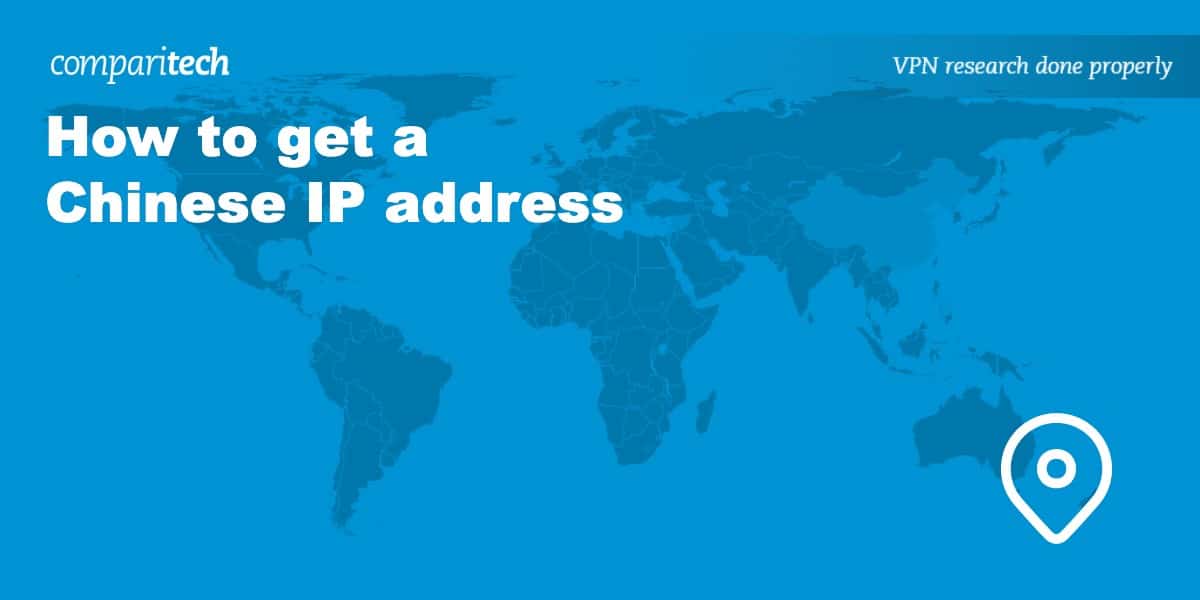Looking to access Chinese websites while abroad but finding them blocked? A VPN connection is your key to unlocking content from platforms like Youku, iQiyi, CNTV, or Tudou, while outside the country. By connecting to a VPN server in China, you get a Chinese IP address, effectively bypassing these geographic restrictions.
But it’s not just about access; it’s also about authority and online privacy. Your Internet Service Provider (ISP) and even the government can monitor your online activities. A VPN with strict no-logs policies can route your traffic through a secure connection, keeping prying eyes at bay.
Short on time? Scroll down for a quick guide to the best VPNs for a Chinese IP address.
- CyberGhost: Our #1 choice to get a Chinese IP address. Large server network, very good speeds, and uncompromising security. Comes with a risk-free 45-day money-back guarantee.
- Private Internet Access: Servers in 90+ countries, including China. Unlimited simultaneous connections and apps that you can customize to your liking.
- PureVPN: Stands out for its very fast speeds. Servers in China for gaining a Chinese IP and is also one of only a few VPNs that still works in China, too.
- Hotspot Shield: Fast enough for flawless streaming with user-friendly apps that make it easy to get a Chinese IP address abroad.
- HideMyAss: A popular service with strong encryption, decent streaming potential, and the ability to get you an IP address from China wherever you are.
WANT TO TRY THE TOP VPN RISK FREE?
CyberGhost is offering a fully-featured, risk-free 45-day trial if you sign up on this page. You can use the VPN rated #1 for getting a Chinese IP address with no restrictions for a month—great if you want to keep streaming your usual shows on a short trip abroad.
There are no hidden terms—just contact support within 45 days if you decide CyberGhost isn't right for you, and you'll get a full refund. Start your CyberGhost trial here.
How to get a Chinese IP address using a VPN
With the right VPN, getting a Chinese IP address only takes a few seconds. Simply follow the steps below, and you’ll be able to access geo-restricted content in no time.
Here’s how to get a China IP address in 5 steps:
- First of all, sign up for one of the VPNs below. We particularly recommend CyberGhost.
- Next, download and install the VPN app. There’ll be several different versions, so be sure to get the appropriate one for your device or operating system.
- Connect to any of your VPN’s China servers.
- Visit a region-locked Chinese site. It should now be accessible as though you were actually in China.
- If this doesn’t work, you can fix most issues by clearing your browser’s cookies and cache, then reloading the page. If not, contact your VPN’s customer support team for more help.
The best VPNs for a Chinese IP address: at a glance
We’ve compared the most important features of the top VPNs here. Prefer to read the in-depth reviews? Start with Hotspot Shield – our #1 choice for Chinese IP.
| No value | CyberGhost | Private Internet Access | PureVPN | Hotspot Shield | Hide My Ass VPN |
| Website | Cyberghost.com | PrivateInternetAccess.com | PureVPN.com | Hotspotshield.com | HideMyAss.com | Ranking for a Chinese IP | 1 | 2 | 3 | 4 | 5 | Devices Supported | Windows, MacOS, Linux, iOS, Android | Windows, MacOS, iOS, Android, Linux | Windows, MacOS, iOS, Android, Smart TVs, Chromebook, Routers | Windows, MacOS, iOS, Android, Linux, Amazon Fire TV, Chrome, Smart TVs, Routers | Windows, MacOS, iOS, Android, Android tv, Apple TV, Linux | Avg Speed (Mbps) | 100+ Mbps | 100+ Mbps | 100+ Mbps | 100+ Mbps | 100+ Mbps | Popular Sites Unblocked | 85% | 70% | 80% | 85% | 30% | Activity logs | No identifying data | Anonymized data |
|---|---|---|---|---|---|
| Best deal (per month) | $2.19 SAVE 83% on the 2 year plan + 2 months free! | $2.19 SAVE 82% on the 2 yr plan + 2 months free | $2.16 83% off the 5-yr standard plan | $2.99 SAVE 77% ON THE 3 YEAR PLAN | $2.99 Get 75% off the 36 month plan |
Best VPNs for getting an IP address from China
Given China’s stringent data retention laws and government oversight, many top-tier VPNs have pulled their Chinese servers. But don’t worry, we’ve got you covered. We recommend only premium VPNs that meet the following criteria:
- At least one server in China, but the more, the better.
- Unbreakable encryption and additional security features.
- Consistent high speeds for a seamless experience.
- Strict no-logs policies to protect your identity.
- Apps for all major operating systems.
We’ll delve into our testing methodology later, but for now, let’s focus on the VPNs that make the grade.
Here’s our list of VPNs that can help you gain a Chinese IP address:
1. CyberGhost

Apps Available:
- PC
- Mac
- IOS
- Android
- Linux
Website: www.Cyberghost.com
Money-back guarantee: 45 DAYS
CyberGhost is our top choice VPN for gaining a Chinese IP address and for almost any country you could think of connecting to. That’s because it has one of the largest server networks of any VPN. It exceeds 10,000 servers in 100+ countries. With servers in Shenzhen, China, you’ll be able to get a Chinese IP address and stream Chinese TV from overseas. The fact that it also makes our list of the fastest VPNs means it’s ideal for streaming.
This is a VPN that allows up to seven simultaneous connections per account. Your subscription also includes live chat and email support 24 hours a day. Security-wise, CyberGhost ticks every box with its 256-bit AES encryption (or ChaCha20 with WireGuard), DNS leak protection, and automatic kill switch. Just as important, this VPN provider operates a strict no-logs policy, ensuring your data stays private.
You can find CyberGhost apps for Windows, Mac, Android, iOS, Linux, and Amazon Fire TV. It also has browser extensions for Chrome and Firefox, although manual configuration is required if you want to set it up with a compatible wifi router.
Pros:
- Servers in 100+ countries, including China
- More than fast enough for streaming and online gaming
- One of the longest money-back guarantees (45 days)
- Strong security with effectively uncrackable encryption
- Quality live chat and email support around the clock
- Proven no-logs policy
Cons:
- Although it can gain you a Chinese IP from abroad, it doesn’t work within the country
Our score:
BEST VPN FOR A CHINESE IP ADDRESS:CyberGhost is our top pick for a Chinese IP address. It impresses with its vast server network, high-speed connections, and strong set of security features. You can even try it risk-free because it comes with a generous 45-day money-back guarantee.
Read our full CyberGhost review.
2. Private Internet Access
 Servers in ChinaTested Jul 2025
Servers in ChinaTested Jul 2025
Apps Available:
- PC
- Mac
- IOS
- Android
- Linux
- FireTV
Website: www.PrivateInternetAccess.com
Money-back guarantee: 30 DAYS
Private Internet Access doesn’t state exactly how many servers it operates, but what we do know is that its network covers over 90 countries. This includes China – a country not covered by most VPNs on the market. PIA isn’t the fastest VPN we’ve tested, but it still averaged 150 Mbps, which is more than fast enough for 4K streaming. It helps that you can order servers by latency to find the fastest.
This is one of the few VPNs that doesn’t impose a simultaneous connection limit. As such, it’s suitable for sharing with family or friends at home. PIA is also unique in that it has highly customizable apps with many extra settings that power users will particularly appreciate. All data is secured with 256-bit AES encryption, and there’s also a kill switch and protection from DNS leaks. PIA has a genuine no-logs policy.
Private Internet Access has desktop (Windows, Mac, and Linux) and mobile (Android and iOS) apps. You can also find an Amazon Fire TV app and browser extensions for Chrome and Firefox. It’s possible to manually configure PIA with select routers.
Pros:
- Provides servers in 90+ countries, including China
- Allows unlimited simultaneous connections per account
- High level of app customization
- Operates a true no-logs policy
- Fast speeds perfect for streaming, gaming, and video calling
Cons:
- Struggles with some streaming services
- Although it can gain you a Chinese IP from abroad, it doesn’t work reliably within the country
Our score:
POPULAR WITH POWER USERS:Private Internet Access offers plenty of advanced features to keep power users happy. It also has servers in China and provides an unlimited simultaneous connection limit. Includes a 30-day money-back guarantee.
Read our full Private Internet Access review.
3. PureVPN

Apps Available:
- PC
- Mac
- IOS
- Android
- Linux
Website: www.PureVPN.com
Money-back guarantee: 31 DAYS
PureVPN is one of only a small number of VPNs that still works in China (most have been blocked as part of the country’s strict internet censorship). It has servers in Beijing to gain you a Chinese IP address and 6,000+ servers in a further 65+ countries. However, it’s PureVPN’s speeds that stand out the most. It ranks as one of the fastest VPNs we’ve tested, averaging an impressive 299 Mbps.
You’ll find many intriguing extras with PureVPN, such as port forwarding and dedicated IP address, albeit they do cost extra. PureVPN’s no-logs policy has been independently audited, and it offers all of the key security features expected, such as 256-bit AES encryption, an internet kill switch, and DNS leak protection. You can also protect up to 10 of your devices at once with a single subscription.
To use PureVPN, simply download an app for Windows, Mac, Android, iOS, Linux, Amazon Fire TV, or Apple TV. Chrome and Firefox browser extensions are also offered. There’s support for VPN-compatible routers (manual setup is required).
Pros:
- One of the fastest VPNs we’ve tested
- Has servers in China and also works in China
- Live chat support is available 24/7
- Large network of over 6,000 servers
Cons:
- Lacks specialty servers such as Double VPN
- Port forwarding costs extra
Our score:
HIGH-SPEED SERVERS:PureVPN is worth considering if you value speed above all else. It has no trouble with 4K streaming or the most intense online multiplayer games. One of the few VPNs that work in China. 31-day money-back guarantee.
Read our full PureVPN review.
4. Hotspot Shield

Apps Available:
- PC
- Mac
- IOS
- Android
- Linux
Website: www.Hotspotshield.com
Money-back guarantee: 45 DAYS
Editor's Note: Hotspot Shield is owned by Point Wild, Comparitech's parent company.
Hotspot Shield has roughly 1,800 servers in 80+ locations, including China, which means it’s great for securely accessing streaming services from all around the world. Further, with consistently high speeds (over 60 Mbps in our latest tests), there’s no need to worry about excessive lag or buffering. This VPN allows you to connect up to five devices simultaneously.
This service uses 256-bit encryption and DNS leak protection to keep your traffic secure at all times. There’s also a kill switch in the Windows and Android apps, which stops all data transferal whenever you lose connection suddenly. Hotspot Shield doesn’t log any personally identifiable information. This VPN even has its own custom protocol named Hydra that can help you browse safely while in China. Customer support is available 24/7 via email or live chat.
Hotspot Shield apps are available for Windows, Linux, MacOS, iOS, and Android.
Pros:
- Works in China
- Fast, reliable speeds
- Works with most major streaming services
- Expansive server network
Cons:
- No anonymous payment options
- May be a little basic for experienced users
Our score:
WORKS IN CHINA:Hotspot Shield is a competitive option as it allows you to quickly and reliably access sites like Youku outside of China. This VPN is fast, secure, and, best of all, it comes with a risk-free 45-day money-back guarantee.
Read our full Hotspot Shield review.
5. HideMyAss
 Servers in ChinaTested Jul 2025
Servers in ChinaTested Jul 2025
Apps Available:
- PC
- Mac
- IOS
- Android
- Linux
Website: www.HideMyAss.com
Money-back guarantee: 30 DAYS
HideMyAss might not have the largest network (around 1,100 servers) but it covers more than 200 locations, including China. This VPN unblocks Chinese TV Channels and streaming services like Youku with ease and is fast enough to stream live HD video with no noticeable lag or buffering. With up to five simultaneous connections permitted, HideMyAss is great for anyone looking to protect all of their most commonly-used devices at once.
This service has numerous security features, including 256-bit encryption, a kill switch (desktop only), IP address shuffler, and protection against IPv6 and DNS leaks. It has recently revamped its privacy policy and no longer logs any personally identifiable information. You can reach support over live chat, 24/7.
This VPN has apps for Windows, MacOS, Android, and iOS devices. It also works with Linux systems and some internet routers, but must be installed manually.
Pros:
- Decent speeds
- Good streaming ability
- Strong security features
- User-friendly apps for major operating systems
Cons:
- No option to pay via cryptocurrencies
- Poor history with regard to privacy
Our score:
LIGHTNING FAST BROWSING:HideMyAss offers the ability to watch Chinese TV live, from anywhere, in the highest possible quality. It also includes powerful security options and a 30-day money-back guarantee.
Read our comprehensive HideMyAss review.
Internet restrictions in China
The Chinese government restricts access to a huge range of content. Although most VPNs will still allow you to access blocked websites while connected to a Chinese server, some might not. For this reason, we’ve created a short list of the kinds of sites and services that are blocked in China:
- Social media services (Facebook, Twitter, Instagram)
- Search engines (Google, DuckDuckGo, Bing)
- Messaging services (Signal, WhatsApp, Telegram)
- Most streaming services (Netflix, YouTube, BBC iPlayer)
- Information hubs (Wikipedia, Quora)
- Cloud-storage platforms (Google Drive, Dropbox, OneDrive)
- Non-Chinese news (The Guardian, NY Times, CNN)
- Privacy or VPN-related sites (OpenVPN, Comparitech, Torproject)
The full list is changing all teh time, so this is by no means an exhaustive account. So use this tool to check if a specific site is blocked in China.
The scoop on China’s Great Firewall
The Great Firewall of China (GFW) is a term used to describe China’s sophisticated and comprehensive internet censorship system. It’s part of the country’s “Golden Shield Project,” a security measure initiated by the Chinese government to control and regulate the Internet within China.
The Great Firewall is designed to block or limit access to specific foreign websites, platforms, and services that the Chinese government deems inappropriate or harmful to its cultural and political stability. This includes popular social platforms like Facebook, Linkedin, and Instagram, news outlets like The New York Times and BBC, and other foreign websites. The Great Firewall also restricts access to several VPN providers, making it challenging for users in China to bypass these restrictions and access the global internet.
Furthermore, the GFW employs various advanced technologies to control the country’s internet. These technologies include IP blocking, DNS tampering, URL filtering, and deep packet inspection (DPI), which allows the GFW to analyze internet traffic, filter content, and block certain information from being transmitted.
While a few select VPNs work in China to bypass the restrictions imposed by the Great Firewall, the practice occupies a legal grey area within China. Any attempt to access blocked content using a VPN in the country could lead to penalties.
Using a VPN to get a Chinese IP address can allow you to access local Chinese content and services from outside the country. First, however, it’s crucial to choose a VPN provider that has proven effective at navigating the complexities of the Great Firewall and has a track record of maintaining user privacy and security, such as those few listed above.
Methodology: Choosing the best VPNs for a Chinese IP address
The Chinese government has been cracking down on VPNs for several years, which is why it’s so hard to find a provider with servers in the country. Still, there are still a few suitable VPNs. To make sure we only recommend the very best services, we created a strict list of requirements:
- Suitable servers: First, we need servers that can get you a Chinese IP address. These might be physically located in China but will more likely be hosted elsewhere to avoid interference from the government.
- Excellent performance: We thoroughly speed-test every service to ensure that they’re fast enough for streaming, torrenting, and general browsing. Their speeds have to be pretty consistent, too, otherwise, you’ll run into problems like lag or random connection drops.
- Powerful security tools: Our top VPNs have to offer a strong set of security and privacy features, including powerful encryption, leak protection, and a no-logs policy.
- High level of versatility: Ideally, services will offer specially-optimized servers for different tasks. Additionally, we’d rather they work with a wide range of Chinese streaming services, including iQiYi, Youku, and Tencent Video.
Read our detailed explainer post to find out more about how we test VPNs at Comparitech.
Getting a Chinese IP address: FAQs
Can I get a Chinese IP address with a free VPN?
It’ll be extremely difficult to obtain a Chinese IP address using a free VPN, simply because there are only a handful of services that still have servers in China. Even if you find a free VPN that does, it’s likely you’ll run into other issues like slow speeds, excessive lag, or an inability to unblock Chinese services.
Of course, there’s also the security risk that free VPNs pose. Prior research has shown that out of 200 free VPN apps, almost 40% contained malware. Worse still, almost one in five never used any encryption at all, meaning they offered their users no extra security whatsoever. We’ve also seen major VPN providers like Hola sell user bandwidth to help run a botnet, so unfortunately, these problems aren’t limited to smaller services.
The best way to protect yourself online is to choose a reputable VPN with a user-first privacy policy.
Can I use a VPN to watch Chinese TV abroad?
Absolutely. Once connected to a Chinese VPN server, most Chinese streaming services won’t be able to tell that you’re actually somewhere else in the world. This means you’ll be able to watch content on all of your favorite platforms abroad.
Note that some services use more stringent methods of geo-blocking. For instance, a VPN won’t help if your payment method has to be linked to a local address, or if you have to provide identification as part of the registration.
DISCLAIMER: Comparitech does not encourage using a VPN to stream content illegally. Please consult local laws thoroughly before deciding to embark on this route. If you have any questions, it’s best to talk to a lawyer in your country of residence.
Are VPNs legal in China?
Despite what you might have heard, VPNs aren’t actually illegal in China. However, the government has worked hard to close down access to them, so most providers’ websites are inaccessible, and you can’t download VPNs from major app stores. As long as you install your VPN before arriving in the country, you should be fine, but we’d recommend saving a copy of the manual setup instructions just in case you encounter any issues.
Why do so few VPNs have Chinese servers?
It’s rather difficult to find a VPN that actually has servers in China. Until recently, providers tended to favor Hong Kong as under the “one country, two systems” principle, this region was spared the brunt of the government’s more repressive tendencies.
Simply put, VPN providers are worried about having their servers seized by the government. Even if they don’t keep logs, it’s possible that close examination will help the government block VPNs more effectively, which is bad for everyone. To get around this, most VPNs use virtual Chinese servers, which aren’t actually located in China and as such aren’t subject to Chinese law.
What Are the Dangers of Using VPNs for a China IP Address?
Using a VPN to get a Chinese IP address comes with its own set of risks, mainly due to the country’s strict authority over internet usage. If you’re caught using a VPN that doesn’t comply with Chinese regulations, you could face penalties. That’s why it’s crucial to opt for a VPN with strict no-logs policies and a secure connection to maintain your online privacy.







